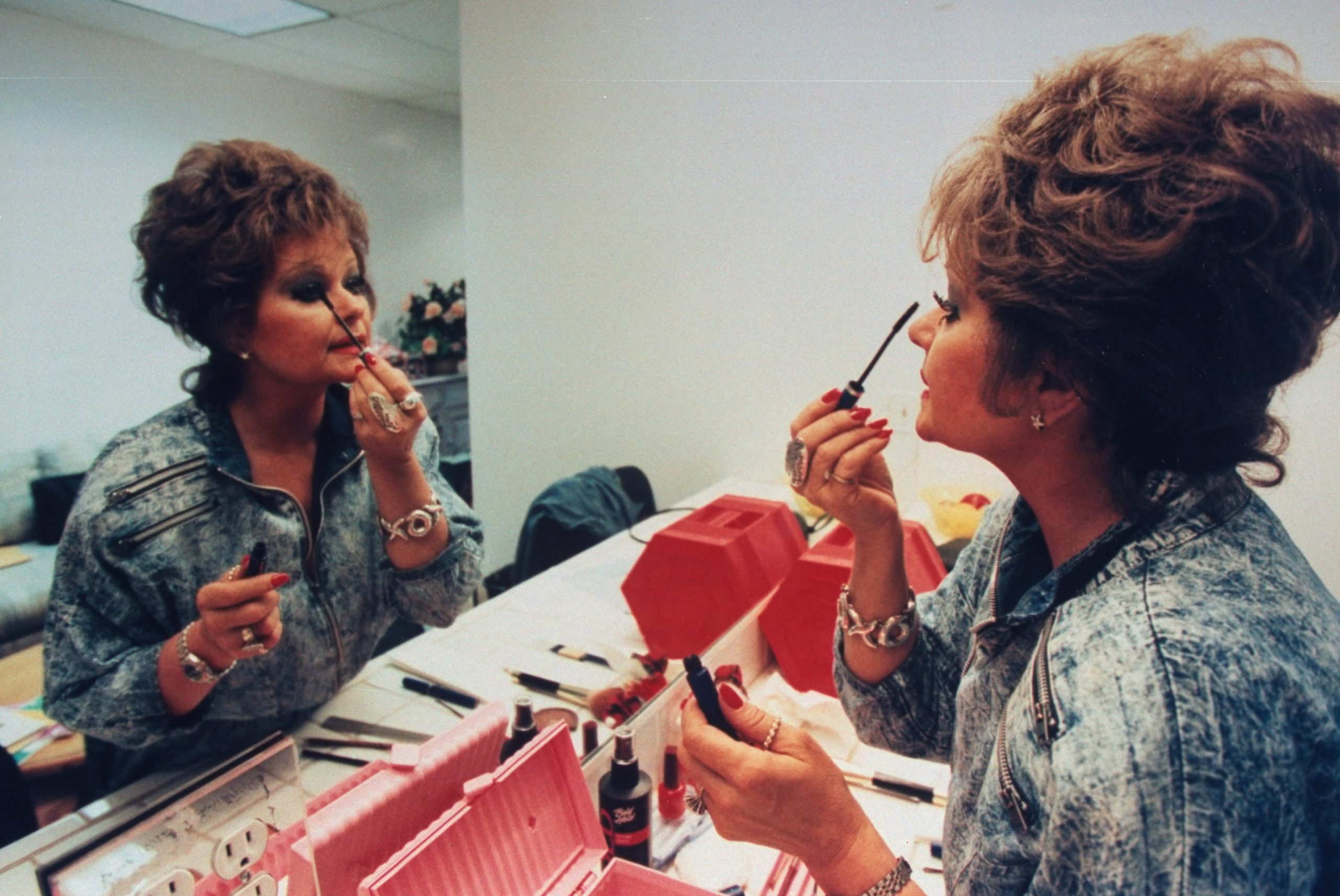Remembering Colon Cancer Warrior Tammy Faye Bakker
- Tammy Faye Bakker, later known as Tammy Faye Messner, died of colon cancer that had spread to her lungs in July 20, 2007. She will always be remembered for her larger-than-life personality (and eyelashes), her televangelist career, the scandals that plagued her family and her eventual rise as a gay icon.
- The term colorectal cancer is used to describe cancers that begin in the colon or the rectum so some people just use the term colon cancer if that's where the disease began.
- Colorectal cancer screenings have made a big difference in colorectal cancer prevention. But with colorectal cancer cases in younger people on the rise, the recommended age for beginning screening has been moved from 50 to 45.
- There are many factors to consider when deciding on the right course of treatment for stage four colon cancer. Oftentimes, treatment might include chemotherapy alone, but some cases will require chemotherapy and surgery. Additionally, your doctor should also explain any newer therapies or clinical trials in case those are the best fit. Make sure to ask your oncologist about all of your options.
Tammy Faye Messner was 65 when she died of colon cancer that had spread to her lungs in July 20, 2007. But prior to harrowing cancer journey, she survived many highs and lows. Her career as a televangelist was distinctive. The 4-foot-11-inch singer proudly graced TV screens across the country donning high heels, loud clothing and over-the-top makeup that often streamed down her face in an unfiltered display of emotion.
Read More
Tammy Faye was encircled by scandal, but she was never implicated in any crimes. And through it all, she had an unlikely fanbase: the gay community.
“Well, you know when I went we lost everything it was the gay people that came to my rescue and I will always love them for that,” she said in the last interview before her death.
She actually became an unsuspecting icon for the gay community. She attended gay pride events, and in 1996, she became the co-host of a talk show with Jim J. Bullock, an openly gay actor.
"I refuse to label people," Tammy Faye said in a 2000 documentary, The Eyes of Tammy Faye, when asked about her attitudes toward gay rights. "We're all just people made out of the same old dirt, and God didn't make any junk."

Donning the same name as her documentary, The Eyes of Tammy Faye also became an award winning biopic in 2021. Actress Jessica Chastain, 45, payed particular attention to Tammy’s seemingly sincere love for the gay community as the movie’s titular character. And the film made sure to include Tammy’s groundbreaking 1985 interview of a gay man, minister Steve Pieters, living with AIDS. Unlike most of her evangelical peers, she showed support and empathy for Pieters and the gay community as a whole.
"No matter what happens to a young person in their life, they're still your boy, they're still your girl," she said when Pieters shared his parents’ reaction when he came out as gay. "And I think it's so important that we as mom and dad love through anything."
Despite the fact that Tammy Faye asked some questions about his love life that would likely be considered offensive today, Pieters thought she they were exactly what her audience needed to hear.
"I've had so many people tell me over the years those were such stupid questions or such silly questions, but for her audience they were the right questions," Pieters told CNN affiliate KABC.
Staying true to her emotive self, Tammy Faye teared up multiple times during the interview.
"How sad that we as Christians, who are to be the salt of the earth, we who are supposed to be able to love everyone, are afraid so badly of an AIDS patient that we will not go up and put our arm around them and tell them that we care?" she said.
Tammy Faye’s Colon Cancer Battle
Tammy Faye struggled with cancer on and off over the last eleven years of her life. She was first diagnosed with colon cancer in 1996. But after a surgery that removed “14 inches of [her] colon,” she went into remission for about eight years.
Then, in March 2004, she spoke with Larry King about how her cancer had returned. And this time the cancer had spread to her lungs and it couldn’t be treated with surgery.
“They’re going to put me on chemotherapy and radiation,” she told King. “Now, this is something I’m going to have to eat my words on because the last time that I had cancer, I refused chemotherapy and radiation.”
She went into a brief remission, but, sadly, announced that the cancer had returned in 2005.
"I'm not worried, I'm not afraid," Tammy said in a phone interview for TODAY. "By the third time you have cancer, you begin to think about your mortality."
The day before she died of the disease, King’s show aired a taped interview with Tammy the last interview she would give. At this point, she was gravely ill and her weight was down to about 65 pounds, but she still had a great sense of humor. She joked that she hoped people would remember her for her eyelashes.
“I talk to god every single day. And I say, god, my life is in your hands and I trust you with me,” she said. “I believe when I leave this earth because I love the lord I am going straight to heaven.”
Understanding Colorectal Cancer
The term colorectal cancer is used to describe cancers that begin in the colon or the rectum so some people just use the term colon cancer if that's where the disease began. The cancer develops when abnormal lumps called polyps grow in the colon or rectum. It takes up to 10 years for a colon polyp to actually become cancer, according to SurvivorNet experts.
Colorectal cancer, like all cancers, presents its own unique challenges for patients on the road to recovery. But Dr. Heather Yeo, a surgical oncologist and colorectal surgeon at New York Presbyterian Weill Cornell Medical Center, wants to remind people how far the treatment of this disease has come.
"One of the most exciting things about my job is that we've made a lot of progress on treatment options," Dr. Yeo says in a previous interview with SurvivorNet. "However, patients are still while they're living longer, they are still living with colon cancer, and so I think it's really important that we talk about how some of the things in your life affect you."
Screening
Dr. Yeo also emphasizes the importance of colorectal cancer screenings such as colonoscopies because most colorectal cancers can be prevented early with screening.
"You Shouldn't Die From Embarrassment": Colon Cancer Can Be Prevented
"In the United States, on a national level, colorectal cancer has been decreasing for the last 20 years," Dr. Yeo says. "And much of that is thought to be directly due to screening for colon cancer."
Even still, colorectal cancer cases are rising among younger people. And in the United States alone, rates have increased every year from 2011 to 2016 by 2 percent among people younger than 50. Because of this increase, the United States Preventive Services Task Force has recently updated its colorectal cancer screening recommendations to begin at age 45 instead of 50.
"We know that colon cancers can be prevented when polyps are found early," Dr. Yeo said. "Lowering the screening age helps somewhat with this. But access to care is a real problem."
RELATED: Why Do So Few Black Men Get Colon Cancer Screenings?
And increasing access is crucial to making sure that we don't see racial disparities within the world of colorectal cancer. Whites and Asians are significantly more likely to be up to date with their colonoscopies than African Americans, Latinos and Native Americans.
Research suggests that tailoring colon cancer screenings to each person's individual risk may be beneficial. If you are not yet 45 but have concerns about your risk, talk to your doctor. Ask about your individual risk based on your lifestyle and family history and find out when screenings would be right for you.
Symptoms of Colon Cancer
Colon cancer might not immediately cause symptoms, but there are signs to look out for.
Below are possible symptoms:
- A change in bowel habits, such as diarrhea, constipation or narrowing of the stool that lasts for more than a few days
- A feeling that you need to have a bowel movement that's not relieved by having one
- Rectal bleeding with bright red blood
- Blood in the stool, which might make the stool look dark brown or black
- Cramping or abdominal (belly) pain
- Weakness and fatigue
- Unintended weight loss
It is important to note, however, that displaying some of these symptoms does not mean you have colorectal cancer. You could also have colon cancer and not display any of these symptoms. Regardless, it is important to bring up any symptoms to your doctor should they arise.
Treating Colon Cancer That Spreads Like Tammy Faye’s
The term stage four colon cancer, or metastatic colon cancer, means that the tumor has spread outside the colon. Colon cancer most often spreads to the liver, but it can also spread to other places like the lungs (like in the case of Tammy Faye), brain, peritoneum (the lining of the abdominal cavity) or to distant lymph nodes.
Treatment for this stage colon cancer often includes chemotherapy alone, but select cases require a combination of chemotherapy and surgery depending on the patient, tumor properties and where exactly the cancer has spread.
Treating Stage Four Colon Cancer
"The overall view of treating metastatic colon cancer is that most of those patients can not proceed to surgery, and so their cancer can never be removed entirely," Dr. Paul Oberstein, a medical oncologist with NYU Langone's Perlmutter Cancer Center, previously told SurvivorNet. "So they're going to live for the rest of their life with their cancer, and we're going to be their partners in giving therapy, or other experimental treatments that will control their cancer for as long as possible with the fewest side effects as possible."
The goal of treatment at this stage is to control the cancer, prevent it from growing or spreading and shrink it. Once the cancer is "under control," the phase of treatment called maintenance therapy generally begins. Over time, chemotherapy drugs might need to be switched if the cancer mutates or changes or the patient simply needs a break from the drugs.
"So then the next step is to maintain it so that the tumor doesn't grow, the person can continue living their life, and have reduced side effects compared to very aggressive chemotherapy.," Dr. Oberstein said.
Another treatment route to consider is with "novel therapies or experimental therapies or clinical trials."
"We emphasize to patients that that's something that we as oncologists are always considering," Dr. Oberstein explained. "So that if at a certain point, a novel therapy comes out, if someone makes an announcement, or we do a clinical trial, and we demonstrate that a new therapy is effective for colon cancer, that's something that potentially will help that person during their course of their disease."
No matter what, there are many factors to consider when deciding on the right course of treatment. Make sure you talk with your doctor about all your options if you or a loved one is faced with stage four colon cancer.
Learn more about SurvivorNet's rigorous medical review process.


